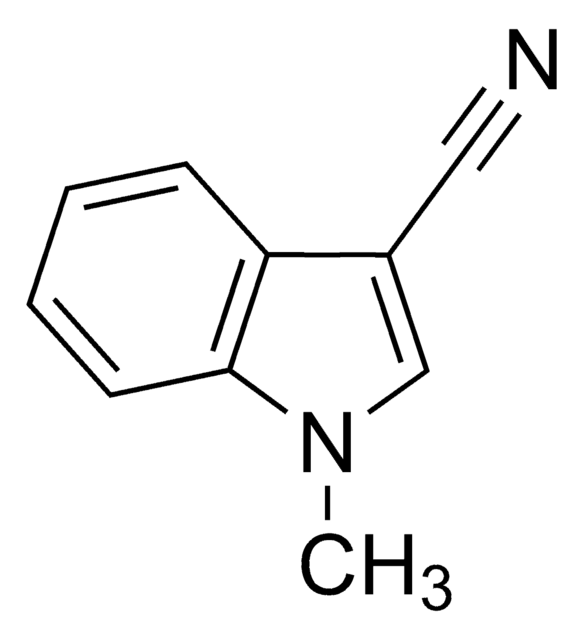129453
3-Indoleacetonitrile
98%
Synonym(s):
(3-Indolyl)acetonitrile, 3-(Cyanomethyl)indole, IAN, Indolylacetonitrile, NSC 523272
Sign Into View Organizational & Contract Pricing
All Photos(2)
About This Item
Empirical Formula (Hill Notation):
C10H8N2
CAS Number:
Molecular Weight:
156.18
Beilstein:
125488
EC Number:
MDL number:
UNSPSC Code:
12352100
PubChem Substance ID:
NACRES:
NA.22
Recommended Products
Quality Level
Assay
98%
form
solid
bp
157-160 °C/0.2 mmHg (lit.)
mp
33-36 °C (lit.)
functional group
nitrile
SMILES string
N#CCc1c[nH]c2ccccc12
InChI
1S/C10H8N2/c11-6-5-8-7-12-10-4-2-1-3-9(8)10/h1-4,7,12H,5H2
InChI key
DMCPFOBLJMLSNX-UHFFFAOYSA-N
Looking for similar products? Visit Product Comparison Guide
General description
3-Indoleacetonitrile (Indolylacetonitrile) is a light-induced auxin-inhibitory substance that is isolated from light-grown cabbage (Brassica olearea L.) shoots. It inhibits the biofilm formation of both E. coli O157:H7 and P. aeruginosa without affecting its growth.
Application
Reactant for preparation of:
- Tryptophan dioxygenase inhibitors pyridyl-ethenyl-indoles as potential anticancer immunomodulators
- Histone deacetylase inhibitors
- Potential kinase inhibitors
- Kv7/KCNQ potassium channel activators
- Kinesin-Specific MKLP-2 Inhibitor
- Pesticides
- Potential PET cancer imaging agents
- Agonists of the Farnesoid X Receptor (FXR) as atherosclerosis treatment
- Butyrylcholinesterase inhibitors
- Necroptosis inhibitors
Storage Class Code
11 - Combustible Solids
WGK
WGK 3
Flash Point(F)
233.6 °F - closed cup
Flash Point(C)
112 °C - closed cup
Personal Protective Equipment
dust mask type N95 (US), Eyeshields, Gloves
Choose from one of the most recent versions:
Already Own This Product?
Find documentation for the products that you have recently purchased in the Document Library.
Customers Also Viewed
Light-induced auxin-inhibiting substance from cabbage (Brassica oleacea L.) shoots.
Kosemura S, et al.
Tetrahedron Letters, 38(48), 8327-8330 (1997)
Jin-Hyung Lee et al.
Environmental microbiology, 13(1), 62-73 (2010-07-24)
Intercellular signal indole and its derivative hydroxyindoles inhibit Escherichia coli biofilm and diminish Pseudomonas aeruginosa virulence. However, indole and bacterial indole derivatives are unstable in the microbial community because they are quickly degraded by diverse bacterial oxygenases. Hence, this work
J Normanly et al.
The Plant cell, 9(10), 1781-1790 (1997-11-22)
Indole-3-acetonitrile (IAN) is a candidate precursor of the plant growth hormone indole-3-acetic acid (IAA). We demonstrated that IAN has auxinlike effects on Arabidopsis seedlings and that exogenous IAN is converted to IAA in vivo. We isolated mutants with reduced sensitivity
Tongbing Su et al.
The Plant cell, 23(1), 364-380 (2011-01-18)
Camalexin, a major phytoalexin in Arabidopsis thaliana, consists of an indole ring and a thiazole ring. The indole ring is produced from Trp, which is converted to indole-3-acetonitrile (IAN) by CYP79B2/CYP79B3 and CYP71A13. Conversion of Cys(IAN) to dihydrocamalexic acid and
Alexandra Kutz et al.
The Plant journal : for cell and molecular biology, 30(1), 95-106 (2002-04-23)
Arabidopsis thaliana expresses four nitrilases, three of which (NIT1, NIT2 and NIT3) are able to convert indole-3-acetonitrile to indole-3-acetic acid (IAA), the plant growth hormone, while the isozyme NIT4 is a beta-cyano-l-alanine hydratase/nitrilase. NIT3 promoter activity is marginal in leaves
Our team of scientists has experience in all areas of research including Life Science, Material Science, Chemical Synthesis, Chromatography, Analytical and many others.
Contact Technical Service










